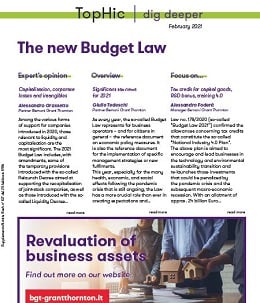-
Transactional advisory services
Find out more about the transactional advisory services of Grant Thornton Financial Advisory Services
-
Valuations
Find out more about the valuations services of Grant Thornton Financial Advisory Services
-
Mergers and acquisitions
Find out more about the merger and acquisition services of Grant Thornton Financial Advisory Services
-
Forensic and investigation services
Find out more about the forensic and investigation services of Grant Thornton Financial Advisory Services
-
Recovery & reorganisation
Find out more about the Recovery & reorganisation services of Grant Thornton Financial Advisory Services
-
Business risk services
Find out more about the business risk services of Grant Thornton Financial Advisory Services
-
Business consulting
Find out more about the business consulting services of Grant Thornton Financial Advisory Services
-
Capital market
Capital market
-
Corporate and business tax
Find out more about our corporate and business tax services.
-
Direct international tax
Find out more about our direct international tax services.
-
Global mobility services
Find out more about our global mobility services.
-
Indirect international tax
Find out more about our indirect international tax services.
-
Transfer pricing
Find out more about our transfer pricing services.
-
Litigation
Our lawyers and accountants can manage all defense measures provided not only by the Italian law, but also by EU regulations and conventions
-
Family business
Find out more about our Family business services.
-
Legal
The client can be assisted in every need and with the same care both on important operations or disputes and on simple matters

-
Back office outsourcing
Find out more about our Back office outsourcing services
-
Business process outsourcing
Find out more about our business process outsourcing services.
-
Compilation of financial statements
Find out more about our compilation of financial statements services.
-
Tax compliance
Find out more about our tax compliance services.
-
Electronic invoicing
Find out more about our electronic invoicing services
-
Electronic storage
Electronic storage is an archiving procedure that guarantees the legal validity of a digitally stored electronic document
-
Revaluation of corporate assets
Find out your civil and fiscal revaluation of tangible, intangible and financial assets
-
Human resources consulting
Find out more about our human resources consulting services.
-
Payroll
Find out more about our payroll services.
-
HR News
HR News the monthly information newsletter by Grant Thornton HR
-
Cybersecurity
GT Digital helps clients structure information security management internal functions, also through partially or totally outsourced functions
-
Agile and Programme Management
GT Digital provides support in the adoption and implementation of different portfolio management
-
Robotic Process Automation
Our “BOT Farm” can rely on digital workers able to help clients in routine activities, allowing employees to deal with more added-value activities
-
Data strategy and management
GT Digital can support clients in seizing the opportunities offered by Big Data, from the definition of strategies to the implementation of systems
-
Enterprise Resource Planning
We support clients in selecting the most appropriate ERP System according to their specific needs, helping them also understand licensing models
-
IT strategy
GT Digital supports clients in making strategic choices, identifying innovation opportunities, comparing themselves with competitors
-
IT service management
We can support with software selection and with the implementation of dedicated tools for the management of ICT processes
-
DORA and NIS 2
The entry into force of the DORA Regulation and NIS2 represents a major step towards the creation of a harmonised regulatory framework
Foreword
Among the various forms of support for companies introduced in 2020, those relevant to liquidity and capitalisation are the most significant. The 2021 Budget Law includes, with amendments, some of the temporary provisions introduced with the so-called “Relaunch” Decree aimed at supporting the recapitalisation of joint-stock companies, as well as those introduced with the so-called “Liquidity” Decree aimed at suspending the obligations provided under the Italian Civil Code for joint-stock companies with reference to share capital losses and the relevant causes of dissolution due to share capital reductions below the minimum threshold provided by law.
Again, with reference to the recapitalisation of companies, it is also worth mentioning the extension provided under Budget Law for 2021 as concerns the application of the revaluation and realignment provisions, allowing - through the application of the norms introduced by Law Decree no. 104/2020 - to intervene also on goodwill and on other intangible assets posted in the Financial Statements at 31 December 2019.
Recapitalisation of joint-stock companies
Talking about the measures supporting the recapitalisation of joint-stock companies, para. 263, art. 1 of the Budget Law includes the incentives already contained in art. 26 of the “Relaunch” Decree. In particular, the following provisions have been extended:
- the tax credit equal to 50% of the losses recorded in 2020 further to the approval of the Financial Statement for FY 2020 exceeding 10% of the net equity, gross of said losses and up to 50% of the share capital increase; in this case the incentive structure is the original one, except for minor amendments, including the one relevant to the term within which the share capital increase is to be completed, i.e. 30 June 2021; the tax incentive no longer applies - and the amounts received plus interest accrued are to be retuned - in case any reserve is distributed before 1 January 2025, or in case the non-existence of any of the requirements provided by the norm is assessed. The provisions contained under Ministerial Decree dated 20 August 2020 and enforcing this tax incentive will remain in force. The tax credit can be used only to offset other taxes starting from the tenth day following the one in which the investment is made, further to the approval of the financial statements for FY 2020 by 3 November 2021. The tax credit in favour of subjects who make capital contributions in cash have not been confirmed;
- The fund dedicated to SMEs, so-called “Fondo Patrimonio PMI”, aimed at the subscription of newly-issued bonds or debentures. Such fund, further to the amendments introduced by 2021 Budget Law, will have the possibility to subscribe both bonds and debentures
- by 30 June 2021
- within the limits of its provision and up to the maximum limit of 1 billion Euro for subscriptions to be made in FY 2021,
- for a total maximum total amount equal to the lower between trice the amount of the resolved and paid share capital increase and 12.5% of the total revenues for the 2019 tax period, exceeding 10 million Euro and up to 50 million Euro
- issued by companies which meet the requirements provided for by the norm.
Financial instruments are refunded after six years from the subscription. The issuing company commits itself not to resolve until the distributions of reserves and the purchase of own shares have been refunded, and not to proceed with the refund of shareholders’ loans.
Suspension of the italian civil code provisions relevant to share capital reduction of joint-stock companies
As far as the suspension of the provisions of the Italian Civil Code regulating share capital reductions is concerned, art. 1, para. 266 of the 2021 Budget Law includes a new version of art. 6 of the so-called “Liquidity” Decree, with a wider scope of application.
In this case, the new provision is confirmed, according to which the requirements under the Italian Civil Code for companies with liability limited by shares (Italian S.p.A) (articles 2446 and 2447) and for limited liability companies (Italian S.r.l.) with reference to losses recorded in the FY underway at 31 December 2020 (i.e. 2020 losses for entities with a FY corresponding to the calendar year), besides the cancellation of the causes of dissolution due to losses.
Aim of the provision is thus to avoid situations in which directors of joint-stock companies are compelled - further to the recording of losses due to the pandemic - to wind-up the company to avoid being deemed liable of a management not complying with the going concern principle and, therefore, to avoid that losses accrued in this extraordinary period might lead to the dissolution of companies still able to generate profits but which - in the short term - cannot overcome their difficulties. The norm also provides for longer terms for the recapitalisation and specifies that:
- the term within which the loss need to be reduced to less than a third is not the first subsequent FY, but the fifth one;
- should the loss lead to a reduction of the share capital below the minimum threshold provided by law, a shareholders’ meeting need to be convened promptly by the directors; the shareholders’ meeting - as an alternative to the immediate reduction of the share capital and its contextual increase up to an amount not lower than the minimum threshold provided by law - can resolve to postpone such resolution to the end of the fifth following FY, until which the dissolution of the company due to a reduction or loss of the share capital will not apply.
The losses accrued in the FY underway at 31 December 2020 will have to be distinctly indicated in the notes to the financial statements, specifying in dedicated tables their origin and the changes occurred in the FY. This means that losses possibly accrued during the 5-year period of suspension of the norm, if autonomously relevant, should be subject to the ordinary provisions.
The realignment of intangibles
In order to improve the assets situation of companies and to allow them to face losses which might arise due to the pandemic, art. 1, para. 83 of Budget Law for 2021 introduced para. 8-bis into art. 110 of Law Decree no. 104/2020 (revaluation of corporate assets and participating interests and realignment), which provides for that provisions under art. 14 of Law no. 342/2000 apply also to the goodwill and to the other intangibles which are not legally protected as resulting from the financial statements of the FY underway at 31 December 2019.
This norm thus extends the possibility to revaluate or realign the values of corporate assets, including goodwill as well as other intangibles.
Since - in practice - it is complex from a statutory point of view to revaluate assets such as goodwill or other intangibles, it would be more convenient to apply the abovementioned art. 14 concerning realignment.
If we consider goodwill, the realignment of values included in the financial statements further to an extraordinary operation through the payment of a 3% substitute tax instead of IRES and IRAP implies, first of all, an economic benefit compared to the provision normally applicable lacking the new norms being analysed. With reference to this point it is worth reminding that:
- art. 176, para. 2-ter of the T.U.I.R. (Italian income tax consolidated text) provides for capital contributions that the transferee company can opt for the total or partial application of a substitute tax on the higher values attributed in the financial statements to the income items representing tangible and intangible assets of the contributed company instead of IRES and IRAP, equal to: 12% on the portion of higher values included within the 5 million Euro threshold, 14% on the portion of higher values exceeding 5 million Euro and up to 10 million Euro, and to 16% on the portion of higher values exceeding 10 million Euros;
- a similar possibility is granted to merging company or company resulting from a merger and benefitting from a demerger, which can thus opt for the application of the substitute tax regime pursuant to the abovementioned art. 176, para. 2-ter of the T.U.I.R., in order for the accounting values to be recognised for tax purposes following to the tax-neutral extraordinary operation.
By comparing the substitute tax rate applied in the two cases (the emergency provision introduced with the 2021 Budget Law and the T.U.I.R. provision), the greater economic benefit is clear. The realignment to the 3% cost thus represents a valid alternative to be carefully considered both from a tax point of view (for the deductibility of the relevant amortisations and depreciations) and from an administrative one (as it represent an administrative simplification, overcoming the difference between accounting value and tax value).


